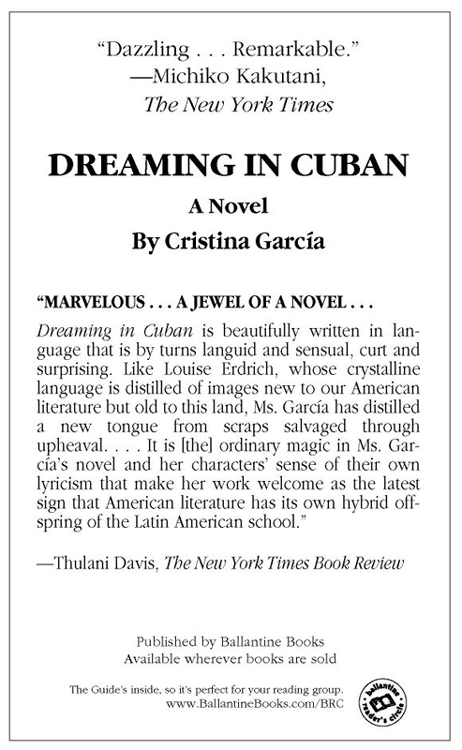Monkey Hunting (18 page)

READING GROUP QUESTIONS AND TOPICS FOR DISCUSSION
1. What drives Chen Pan to leave China? What is he pursuing?
2. How do the characters, particularly Chen Pan and Lucrecia, navigate questions of identity and race? What about Domingo? Does he end up trapped by his identity?
3. What role does the fantastic play in the novel? How do the various characters—Chinese, Cuban, African—embrace it?
4. Why does Chen Pan buy Lucrecia? Does his buying of her make him more or less sympathetic?
5. Why does Chen Pan go off to war to defend Cuba? What are his feelings toward his fellow Chinese?
6. Why does Domingo go off to war? Discuss the ironies of his being an Afro-Cuban-Chinese man fighting for the U.S. against the North Vietnamese.
7. Compare and contrast how the fallout from the Cuban Revolution and the Chinese Cultural Revolution affects the characters’ lives.
8. Do you see an analogous colonialist relationship vis-à-vis Cuba and the U.S. and Vietnam and China?
9. What effects do the shifts in character, setting, and time period have on your experiencing and understanding the novel?
10. Why does Chen Pan tell his grandson to always choose the difficult path? (Page 193.)
11. Does Chen Pan ever assimilate into the Cuban culture? In what way is he a part of it? In what ways does he remain an outsider?
12. Compare and contrast the ways that Chen Pan, Pipo Chen, and Domingo ultimately are betrayed by the promises of other homelands, and how they reconcile themselves to this betrayal.
13. The author seems to be challenging fixed notions of identity. How is this shown throughout the novel? How have your thoughts regarding identity been changed?
14. The women Chen Pan and Domingo love are extremely disadvantaged in their relation to the men, one being a slave, the other a prostitute. Discuss this.
15. How is sex depicted in the novel?
16. The middle part of the novel is titled, “Traveling through the Flesh.” What does that signify, particularly in the relationship between Chen Pan and Domingo?
17. Do Chen Pan and Domingo change significantly as a result of their life experiences? If so, how?
18. What happens to Chen Pan in the end? What gives him immortality?

ACKNOWLEDGMENTS
Ongoing thanks to my friends and generous readers: Scott Brown, Wendy Calloway, Mona Simpson, José Garriga, and George de Lama. Special thanks to Philip Caputo, Hanh Hoang, Evelyn Hu-DeHart, and Kenyon Chan for their excellent suggestions, to Norma Quintana for her sisterhood, and to Leonard Comess for his kind wisdom. And finally,
mil
besitos
to my daughter, Pilar, for her humor and sweet forbearance, and to my goddaughters, Caridad and Grace.
A NOTE ABOUT THE AUTHOR
Cristina García was born in Havana and grew up in New York City. She is the author of
Dreaming in Cuban,
which was nominated for a National Book Award, and
The Agüero Sisters.
Both novels have been widely translated. She is also the editor of
¡Cubanísimo! The Vintage
Book of Contemporary Cuban Literature.
Ms. García has been a Guggenheim Fellow, a Hodder Fellow at Princeton University, and the recipient of an NEA grant and a Whiting Writers’ Award. She lives in California with her daughter, Pilar.
ALSO BY CRISTINA GARCÍA
Dreaming in Cuban
The Agüero Sisters
This is a work of fiction. Names, places, and incidents either are products of the author’s imagination or are used fictitiously.
A Ballantine Book
Published by The Random House Publishing Group
Copyright © 2003 by Cristina García
Reader’s Guide copyright © 2004 by Cristina García and The Random House Publishing Group, a division of Random House, Inc.
Ballantine and colophon are registered trademarks of Random House, Inc.
Ballantine Reader’s Circle and colophon are trademarks of Random House, Inc.
Library of Congress Control Number is available upon request from the publisher.
eISBN: 978-0-307-41610-0
v3.0
